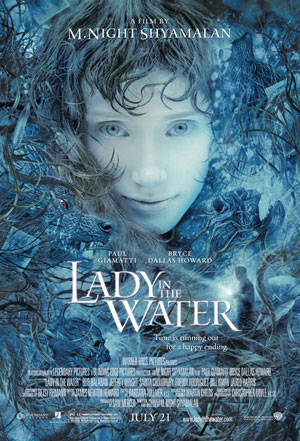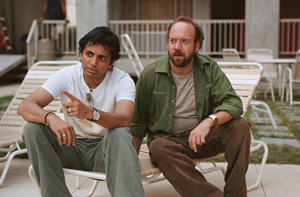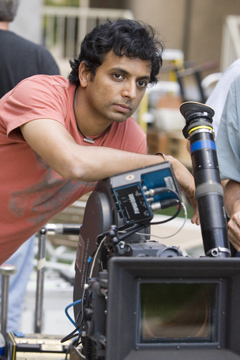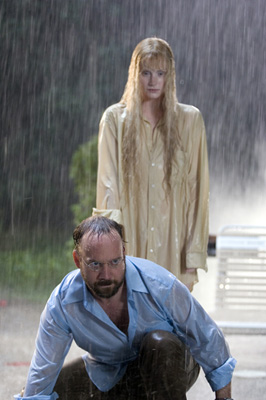 There’s
There’s
really no need for an intro here because Night’s flowery responses and film
philosophy do the job themselves. But just to preview, he covers everything from
eastern thought, to appreciating film critics, to believing in yourself to make
a change in the world. Isn’t that enough to pique curiosity? I can’t wait to
see what you Chewers have to say… Enjoy!
Q: This was originally a fairy tale
for your kids and then it evolved into something a little scary, and a little
darker. What was the evolution in your mind in terms of how far you wanted to
take it as far as being scary?
Shyamalan: Well, when it was back at
Disney (laughter), there was a sense of… they were so stringent about what has
the Disney label on it, so at that point, I didn’t know, and to the point that
it hurt the piece, because I was so… I wasn’t allowing it to be, you know,
visceral, because I was so worried about those kinds of things. When that
didn’t happen over there, it really freed me up to do it so I went, “okay.”
When I was shooting the movie I was going, “I’m starting to lose some kids,” it
was getting scarier and scarier and scarier. So for me it stops at around 8
years old, and for 7 year olds, it probably will be too much.
Q: How important was storytelling to
you as a kid and do you read bedtime stories to your children?
Shyamalan: I do that a lot, but not as
much as I should, because they ask every day. And you’re just like, “No, leave
me alone!” and you get to that point, like we were at dinner in France, it was
our last day in France and they’re like, “Tell me a story” and I’m like “No,
we’re just going to sit here and smell the lavender, that’s what we’re going to
do.” And they’re rolling their eyes.
Q: How old are they?
Shyamalan: 9 and 6. I wasn’t told stories like that when I was a kid, no, but I
read a lot and wrote a lot as a kid, a lot of stories, so I always thought it
was very magical. I guess the storytellers were the filmmakers at that time,
like Lucas and Spielberg, telling those amazing stories when I was 7 to 12. I
mean, I had the storytellers, the best storytellers in the world, maybe of my
generation, my lifetime, they were telling me stories right when I was ready to
hear stories. “Once upon a time in a galaxy far far away…” “Yes!”
 Q: Where did this story come from?
Q: Where did this story come from?
Does it come from the subconscious trope of movies in your head, from reading
Joseph Campbell or your South-Asian background?
Shyamalan: I think a lot of it… all of the above. There’s always some hook that
gets me, like the idea of what if someone was living under your pool, why would
they be there and then why would they be there spawns a whole story that comes
from that, some meaning from it.
Q: Why are there so many Bob Dylan
songs in the movie?
Shyamalan: The sense of revolution that he obviously didn’t want to take on his
own shoulders, that wasn’t his intention, but for me, his music was a time of
“We can change things, it’s in our hands, the community, group coming together”
all those feelings of traditional, let’s do it the folk way. Also his
storytelling in his songs, this sense that he was a storyteller, that he told
these stories that are very moving and metaphorical. He was an inspiration when
I was writing it. And I was literally writing it listening to Dylan songs, kind
of like if you had a fictional group of people at a time of trouble in the
world, and there was a lot of fighting going on, and this community realized
that they could make a difference, that they were part of a beginning of a
change.
Q: You have a pivotal part in the film
which leads me to believe you really had something to say through that
character. That character was going to change the world, but do you really
believe that filmmaking or writing can change the world?
Shyamalan: Well, you know what it is?
Let me answer the first part of the question. This is my seventh film.
In the first movie that was “Praying With Anger,” I was the lead in that, and
that was a very tiny movie in India and then “Wide Awake” I wasn’t in that at
all, and then in “Sixth Sense” and “Unbreakable” I had very small parts,
because I was learning to make movies in the big studio system, and then
“Signs” I had a big part. There was only like five characters in it, and I was
the fifth character, and for me, it was an important part emotionally, and this
was more like that for me. Those two movies had characters that I wrote that I
was like, “I really need to say that emotionally, that means something to me.”
Now with regards to the character in “Lady,” the idea of Harriet Beecher Stowe
was that idea that really caught me, and I said, “Wow, this idea that you write
a book and somebody like Lincoln reads the book, and other people in that time
period read that book and you’re creating change and then someone who can make
a difference decides to do something about it.” Harriet Beecher Stowe didn’t
know she was doing all that, she was just writing a book, but it actually
opened minds and created point of views. The power of the writer is the wish
that an angel would come in and say, “You think that that sucks right now? You
should do it because down the line, the 80th person that’s going to
read it and is going to cause this to the left and this to the right, you’ll be
part of a chain that you can’t possibly know, but it’s very important that you
keep acting, that you be proactive, that you believe you have a purpose.” The link in the chain, that if any one of us
doesn’t do our little link in the chain, the eventuality doesn’t happen, so if
we’re all just a group of people who don’t believe in ourselves, don’t believe
in our purpose, we can’t build off each other. How do we know what part we’re
going to play in the chain? Just positive energy, empowering positive energy
moving forward will create an incredible network of things. To be part of it,
so that if an angel could tell you, so you wouldn’t give up that.
How many
people don’t believe in that, that they’re part of that inevitable change of
things? My babysitter once just left a book by mistake that she was reading
about how people are having a hard time making ends meet because their cost of
living is so high and they’re not saving anything, so they’re always renting.
It’s called “Nickel and Dimed” this book, so I went and I bought a bunch of low
income houses and built them up and gave them to families in Philadelphia,
because my babysitter was reading it, because her teacher had assigned it to
her, because the teacher was moved by this lady. Look at that chain of events,
you know what I mean? It’s just an empowering thing to be able to hear, if you
could, the beauty of the spiral of things that happen. If God could tell you
when you die, this is what you did. It would be so cool.
Q: The movie has an eastern, almost
Buddhist feel. Can you talk a bit about those influences?
Shyamalan: Yeah, it does have a Buddhist… I’m definitely big in the Buddhist
thing, I’m all over that, and hearing about the story being told, when I was
hearing it in my head, I was like, “Wow, it’s more of like an Asian
philosophy.” I don’t know why I felt that, but it had more of an Asian
philosophy and tradition. They believe in the storytelling, whether it’s the
Hindu philosophy or whether it has a million stories, and we know they’re all
metaphorical, but you believe them, not as literally that each of those
Gods—Vishnu and all those—actually exist, but still, the reverence for them is
extraordinary, so when Young-soo and her mom are talking, Young-soo learns,
she’s kind of acclimated, or wants to be an American in the way she’s still
trying on clothes, she dresses like Britney Spears, she’s trying, whereas me
and my sister [in the movie] are acclimated Americans, we are in the system,
you know what I mean? She’s not in the system, she just wants to be, but she’s closer
to her traditions than me and my sister are, so she makes that speech in the
end, “You know, it’s time to prove these stories are real.” She’s much more
like her mom than she knows. She’s wearing Britney Spears clothes, but she’s
just one step away from the old traditions.
 Q: About the scene with the smarmy
Q: About the scene with the smarmy
film critic was that a thumb in the face to critics? [Spoiler Alert!]
Shyamalan: I was in a very raw mood when I wrote the movie, and it came out
very heightened and parody-like. The movie had an eccentricity about it, like
“Princess Bride.” I loved that movie. Those characters commenting on the story
as the story’s going on, that you’re commenting on a structure of stories, how
stories are told, are they important? Do you believe in them? All the elements
are talking about storytellers and storytelling so to have a character in there
who has stopped learning in there, he’s a part of a world where everyone is
realizing their potential of what they’re about, but he’s stopped learning, and
the moment that he realizes it’s too late, that he thinks he’s this part of the
story and he’s safe, cause that’s the only way stories are told because it’s a
family film. This couldn’t possibly happen. There’s always a moment where I
want to change… my favorite thing about “Lady” is that it changes and blossoms.
[SPOILER] And obviously Farber’s death is one of those moments where it kind of
just starts going on right on the edge of mania, and then starts unfolding in a
way, where you’re not sure what’s going to happen. That’s a nice feeling to be
in a movie where you can stop the movement, that’s a really cool moment.
Q: Did any critics know you were
going to do this?
Shyamalan:
I was thinking of putting a list, “Inspired by…” (laughter) No, it’s just
goofing around.
Q: Did Bob Balaban enjoy the idea of
being able to play this character?
Shyamalan:
He loved it! We met and I said, “I’m going to say to you what I never said to
another actor is I want you to start three-dimensional and become
two-dimensional, so it becomes more of a parody by the time it happens, so
you’re going to deconstruct as you go” and he was like, “I’m totally into
that.” I wish he kept his answering machine message, because I gave him the
script, and I didn’t tell him what the part was. I just said “You’re the part
of Farber” and he called and left me this message, it was so funny, I wish I
kept it, [SPOILER] “Oh, to die like that! Ohhhhh!”
Q: Do you read what critics say
about your films?
Shyamalan: You know, I get a general vibe that if you
get caught up in too much of this, you lose your mind, because it’s all a
momentary perception thing that happens, and it’s so clouded, these movies are
so clouded by the other movies or being a part of the group, or the
expectations, that it can be damaging to you as an artist when you’re just
crippled like that, so I get a general sense. What you think may be the
critical response to my movies is very different than the reality. Like say,
for example, what is my best-reviewed movie? (Someone guesses Sixth Sense)
Wrong. “Signs” is my best reviewed movie, next is “Unbreakable,” and then next
is “Sixth Sense” and then next is “The Village” and that’s the order of the
reviews. And also, “Signs” is my most popcorn movie so the least aspiring to a
higher thing. It’s that aspiring to something higher that always gets everyone
going “Oh, yeah, motherf*cker?” That gets everybody all riled up, so it’s
interesting, but also the perceived realities are very different as you move
on. If everything was re-reviewed now, it probably would be a different group
of reviews that would come out.
Q: When you’re directing and doing
post-production, as a writer, do you still have time to write and work on the
next projects you want to do, or do you wait until one movie is done before thinking
about your next one?
Shyamalan: Yes and no. I wrote most of
this one simultaneously with “The Village.” I have a full notebook of ideas,
you know, about everyone realizing their parts and there’s this weird story and
they all might be characters in it, and one character that doesn’t believe he’s
a character in it, and I was like either this guy has to be a lawyer or a critic,
he’s one of those.. [laughs]
 Q: But do you have time to write
Q: But do you have time to write
while you’re making movies?
Shyamalan: I have notebooks of ideas. It’s dangerous, because you may burn a
great idea if you do it too early. Like all during “Lady”, I had this great
notebook of ideas about this movie I was certain was going to be my next movie,
and as soon as I finished “Lady” I was like, “Dammit!” I dated that one, too
long. I didn’t commit, and now it’s like okay, I feel like I’ve been there
already. I got another idea that has so much power, and it’s new and it’s
fresh. It’s very dangerous to explore, it’s a dance between holding-off the
next idea as much as you can, you know?
Q: Can you talk about casting this
film, especially Bryce and Paul? What did you seen in Bryce that made you want
to cast her a second time?
Shyamalan: You know, she has a regalness, an unusual otherworldly quality about
her. She doesn’t have normal 24-year-old actress affects. She doesn’t think
that way, it’s odd. Whether it’s how unusual her parents brought her up and the
circumstances in which she was brought up. She has strong dogma. Her belief
system is really like a monk, she believes in things, you know, like that, to
the point where you’re like, “Come on, just be a human being! Just chill out!”
but she’s like that and that would be perfect for Story that she doesn’t have
to pretend to be otherworldly. There’s a really ethereal quality inherently
about her, that’s great. And Paul’s kind of everyman brilliance is just great
against the two of them. They both give off such different vibes, even as human
beings, they do.
Q: How was it working with Geoffrey
Wright? I’ve heard he can be difficult.
Shyamalan: Oh, man, I love it. I’ve heard those stories, too, but he was a joy,
an absolute joy for me. I really believe that actors in general, I’ve had a lot
of actors in my movies who have supposedly been difficult, but when they know
that someone’s driving the bus, then they don’t have to take the wheel. When
they truly believe that, they don’t even think about taking the wheel. They
don’t want to. They want to ride the bus and go in the direction, you know what
I mean? They’ll check and see “Are you driving?” and they 100% believe
that. At the read-through for “Lady”
which was really a magical movie, because my movies are a lot like plays, a lot
of dialogue, and a lot of… in rooms, and I hire only theatrical actors,
especially on this one, only theatrical actors, and they did it like a play,
and they were amazing. The table was in awe, because we had two Jedis at the
table, we had Paul and Geoffrey, just in awe, like you were just, “Wow”
watching the two, and then when we did scenes like the bathroom scene where
they’re reading the crossword puzzle, the group was just in awe of these two
guys who could basically do anything. Geoffrey just twitches a muscle and
you’re like, “Whoah!” They’re limitless talents, those two.
Q: Would you consider directing a
movie by someone else and has Warners hit you up to direct a Harry Potter movie
yet?
Shyamalan: You know, that dance has gone on a long time, that Harry Potter
dance. The problem is that it is a living breathing thing now, all by itself.
When it comes over to my camp, it needs to be kind of handed over, adoption
papers and everything. And that’s a tricky, tricky move.
Q: Have you ever met with JK
Rowling?
Shyamalan: No, I haven’t met with J.K., but the first one was offered to me,
and it conflicted with ‘Unbreakable,’ which was unfortunate. I would
definitely, but I think probably before that I would adapt a book. I’ve gotten
close a few times to adapting books. Life of Pi was one of them.
Q: Do your daughters see you like
someone more than Dad?
Shyamalan: Now more and more, which is unfortunate, because they’ve been
blissfully innocent and hopefully, they can stay that way. Now they’re 9 and 6,
and one of them is going to be 10 soon [probably the one that’s 9 now]. You
know, they walk down to school and the big girls in high school are like “Hey”…
Q: What about Chris Doyle?
Shyamalan:
Yeah, Chris Doyle is the greatest. He’s insane. You know, again it’s that
feeling of being very raw and doing things very viscerally that you weren’t
entirely in control of what was going to happen, but you felt that something
good was going to come out of it.
Q: How are you involved in the
marketing of your movies these days?
Shyamalan:
Yeah, I definitely do. There’s a certain integrity to them [trailers,
commercials] that I wouldn’t want them to cross, so I’m involved with that, and
I give them ideas that “you can try this angle or that angle and this is where
I was coming from” but this time I just gave them my thoughts and took off to
France.
Q: Is there anything you can tell us
about your next project?
Shyamalan: Well, the one I think I’m going to do is going to have a big star in
it. (laughter) Different than Paul.
Q: Are you going to be in it as
well?
Shyamalan:
You never know, you never know, it wouldn’t be any bigger part than this. In
fact, I feel a little bit more comfortable if it was like 15-20% less, so that
the balance is just right for the directing, you know, cause it’s difficult to
do both. Very difficult to do both because you want to just walk on the set and
totally be that guy. And we’ll see what happens but if they’re going “are these
curtains good?” You’re like, “Hold on a sec. No, they’re terrible!” That’s a
tricky balance, but the theatrical, we spend a lot of time rehearsing, I think
it was like two weeks, so that made it like a troupe of actors, which was
really great for us.